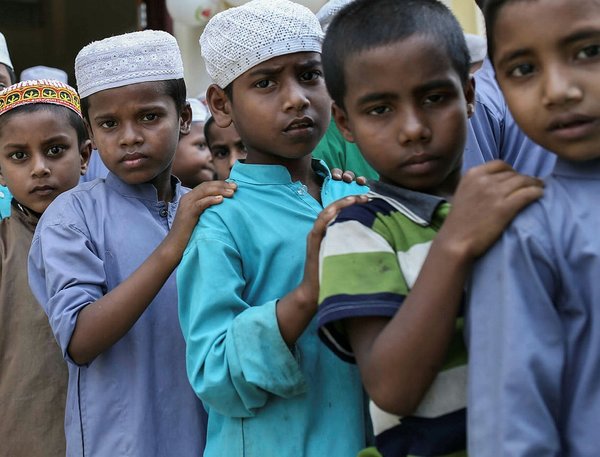A Turkish delegation of lawmakers and officials from the Turkish Disaster and Emergency Management Authority (AFAD) visited an orphanage in Bangladesh's Cox's Bazar on Sunday.
Many Turkish MPs, including Justice and Development (AK) Party Konya deputy HÜsnüye Erdoğan, Tekirdağ Deputy Ayşe Doğan, Nevşehir Deputy Mustafa Açıkgöz, Hatay Deputy Hacı Bayram Türkoğlu and Kayseri Deputy İsmail Tamer as well as AFAD Chairman Mehmet Güllüoğlu and Vice President İsmail Palakoğlu were part of the delegation that visited the orphanage.
The delegation played with the children and received information about the work at the orphanage and education complex which was established by the Turkey-based Yardimeli aid agency.
The Yardimeli Darul Hikme Education and Social Complex, a three-floor school building along with a mosque, was built on an area of 12,000 square meters (129,166 square feet). The school building has 20 classrooms, five dormitory rooms for orphans and two large halls for social activities.

Speaking to Anadolu Agency, Yardimeli's Bangladesh coordinator Mehmet Akif Çitil said the Rohingya orphans and Bangladeshi children in need are receiving education at the complex which is the largest in the region.
Çitil said that 64 orphans are staying at the complex, while 500 children are studying at the complex.
"We have been operating in the region since 2008. Since the crisis intensified, we continued to be with our Bangladeshi and Arakanese children with the opening of more than 400 deep water wells, orphanages and schools," he said.
Muahmmed Suheyl, 10, one of the children at the orphanage, said he lost his father in an accident three months ago.
"I live a good life here. The teachers are treating us good, it is nice to receive education," said Suheyl, who has seven siblings.
Since Aug. 25, 2017, more than 750,000 refugees, mostly children and women, have fled Myanmar and crossed into Bangladesh after Myanmar forces launched a crackdown on the minority Muslim community, according to Amnesty International.
At least 9,000 Rohingya were killed in Rakhine state from Aug. 25 to Sept. 24, according to Doctors Without Borders.
In a report published on Dec. 12, 2017, the global humanitarian organization said the deaths of 71.7 percent or 6,700 Rohingya were caused by violence. They include 730 children below the age of 5.
The Rohingya, described by the UN as the world's most persecuted people, have faced heightened fears of attack since dozens were killed in communal violence in 2012.
The UN has documented mass gang rapes, killings, brutal beatings and disappearances committed by security personnel. In a report, UN investigators said such violations may have constituted crimes against humanity.